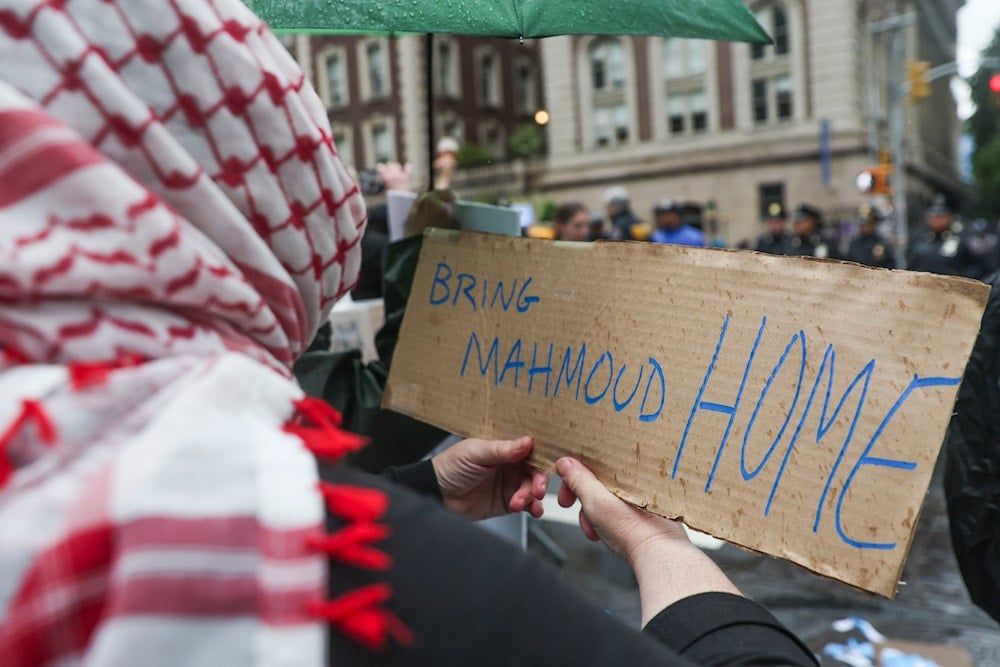US can’t deport Khalil over Rubio's foreign policy claim, judge rules
The federal judge's decision deals a blow to the Trump administration’s immigration tactics.
-

A protester holds up a sign reading, "Bring Mahmoud Home", at a pro-Palestine protest donning the Koufiyyeh, in this undated photo. (AP)
A federal judge has halted the Trump administration’s attempt to deport Columbia University student and green card holder Mahmoud Khalil, ruling that his removal on foreign policy grounds likely violates constitutional protections.
The Mahmoud Khalil deportation case marks a major legal challenge to the government’s broad use of immigration law to target student activists linked to pro-Palestine causes.
The injunction, issued Wednesday by US District Judge Michael Farbiarz in New Jersey, prevents Khalil’s deportation or continued detention based on a determination by Secretary of State Marco Rubio that Khalil’s “presence or activities would compromise a compelling US foreign policy interest.” The ruling is set to go into effect Friday morning, giving the administration a brief window to appeal.
Farbiarz, who had previously signaled concern over the government’s legal justification, concluded that deporting Khalil for foreign policy reasons likely infringes on his rights. “The Court finds as a matter of fact that [Khalil’s] career and reputation are being damaged and his speech is being chilled, and this adds up to irreparable harm,” he wrote.
Judge cites First Amendment concerns, irreparable harm
The court emphasized that its ruling does not preclude the government from seeking to deport Khalil on other grounds, such as omissions in his green card application, a justification immigration officials have also cited. However, Farbiarz stated that Khalil is “almost certainly” being held primarily due to Rubio’s foreign policy designation, not because of routine immigration infractions.
“It's extraordinarily rare for lawful permanent residents to be detained over paperwork omissions,” the judge noted.
This case is one of several where the administration has invoked foreign policy authority under a Cold War-era statute to justify immigration enforcement actions. The use of such authority has raised alarms among civil rights advocates, who argue it violates the principles of First Amendment student activism.
Khalil’s deportation halted... for now
While the ruling halts Khalil’s deportation for now, it does not dismiss the government’s secondary claim that he left out information on his immigration forms. Still, legal experts say this is a relatively minor infraction and rarely results in pre-trial detention for green card holders.
Khalil was arrested in March and transferred to a detention facility in Louisiana, where he has remained. According to his attorneys, the case represents an effort to chill campus-based dissent against "Israel" and US foreign policy in the Middle East.
The State Department and the Department of Justice have not yet commented on the ruling.
Other student activists also targeted by Trump officials
The pro-Palestine student crackdown also targeted Mohsen Mahdawi, another green card holder and student at Columbia, who was detained weeks after Khalil during what he believed was a citizenship interview. A judge later ordered Mahdawi’s release, but deportation proceedings are ongoing.
At Tufts University, graduate student Rumeysa Ozturk was detained after co-authoring a campus op-ed. She, too, was later released by court order. Both students remain under federal scrutiny and could face further immigration actions.
Troubling trend of targeting foreign students
Civil liberties advocates argue the cases follow a troubling trend of targeting foreign students for protected political expression. In Mahdawi’s case, the judge compared the government’s tactics to 1950s-era McCarthyism.
Secretary of State Marco Rubio has defended the administration’s aggressive approach. In March, Rubio said, “We do it every day. Every time I find one of these lunatics, I take away their visa.”
The administration has justified its actions under a statute allowing the revocation of visas and removal of non-citizens deemed to pose “adverse foreign policy consequences.” Critics say this discretionary power, especially when applied in politically charged contexts, undermines free speech protections and opens the door to ideological profiling.
Despite the legal setback in the federal court immigration ruling, the Trump administration has signaled it will continue to pursue similar cases. But for now, Mahmoud Khalil’s deportation is blocked, a development that immigration attorneys and rights advocates view as a critical pause in what they describe as an unconstitutional campaign against dissent.

 4 Min Read
4 Min Read










